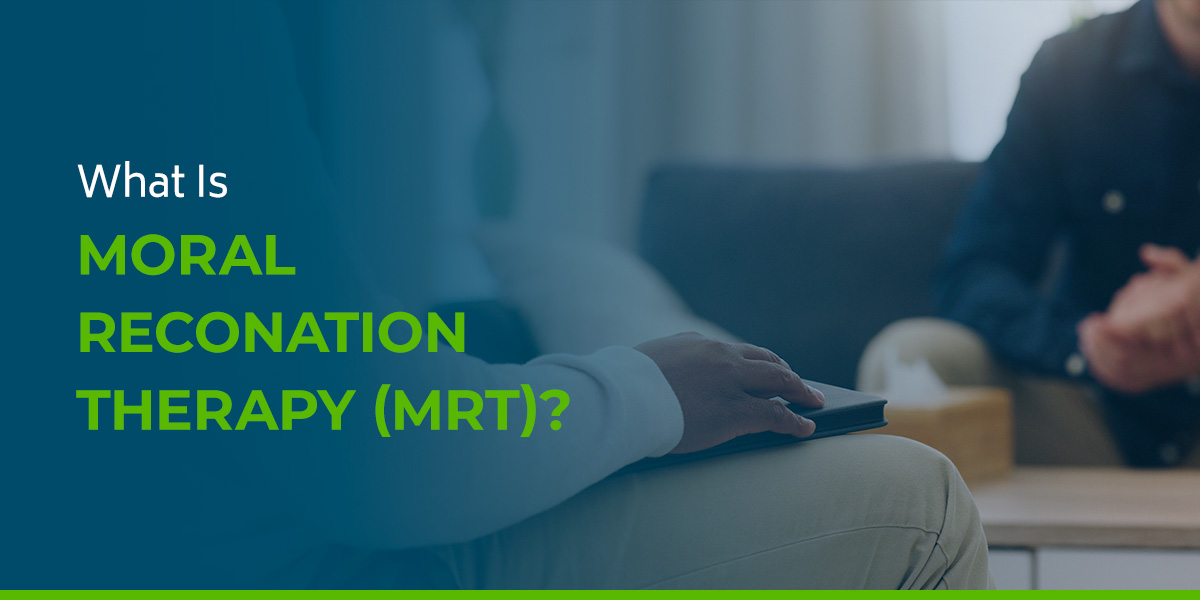
What Is Moral Reconation Therapy (MRT)?
In behavioral therapy settings, it is important to properly assess your clients to align them with the most effective interventions. However, some individuals may receive a number of evidence-based treatments to no avail. As a mental health professional, you understand that each individual requires a unique therapeutic approach to promote positive change in their lives.
When caring for a treatment-resistant client who has not responded well to similar therapies in the past, it can help to explore new cognitive-behavioral interventions like moral reconation therapy (MRT). This effective yet lesser-known approach has proven to be highly effective in reducing relapse in clients with a range of challenges, including substance abuse, criminal activity, family and social difficulties, and legal problems.
The Origin of Moral Reconation Therapy in Psychology
Moral reconation therapy is a behavioral therapy approach that helps clients focus on the moral aspects of their behavior to enhance moral reasoning and positive identity. MRT was created in the 1980s by Dr. Gregory Little and Dr. Kenneth Robinson, who believed this method could significantly lower recidivism in clients with addiction and criminal behavior.
Though it was initially created as a behavioral treatment to reduce the likelihood of offender populations reoffending, it has now become widely used in behavioral health settings to change thought processes associated with negative behaviors, addiction, trauma and domestic violence.
Key Principles and Goals of Moral Reconation Therapy
MRT is a form of cognitive behavioral therapy (CBT) in that it aims to assess current relationships and replace antisocial cognitions and behaviors with more adaptive choices by addressing:
- Impulsivity.
- Faulty thinking patterns.
- Distorted perceptions of right and wrong.
- A lack of empathy.
- Egocentric behaviors.
- Poor decision-making.
MRT encourages clients to reflect on the moral and social consequences of their actions that are associated with using substances or engaging in criminal behavior.
Though the general goals of MRT are to foster moral development and decision-making, therapists can also help their clients achieve:
- Pro-social values and beliefs.
- Improved quality of life.
- Improved frustration tolerance.
- Enhanced self-esteem.
- Reduction in self-indulgence.
- Positive self-identity.
The specific treatment levels of MRT can vary, especially depending on the client's level of commitment to improving their moral reasoning and diligence to not reoffend.
Who Benefits From Moral Reconation Therapy?
Moral reconation therapy is highly effective for a range of individuals across all ages and demographics. Your client may be a good candidate for MRT if they are seeking to improve adaptive skills. Potential candidates include individuals:
- With criminal histories.
- With substance abuse disorders.
- With treatment-resistant conditions.
- Who want to reduce recidivism.
- Who want to enhance their interpersonal skills.
- Looking to improve their moral decision-making.
- Who have experienced trauma or domestic violence.
MRT can also be a beneficial approach for clients who have received CBT or a similar therapy but require more effective interventions for criminal thinking and associations, including those with multiple convictions.
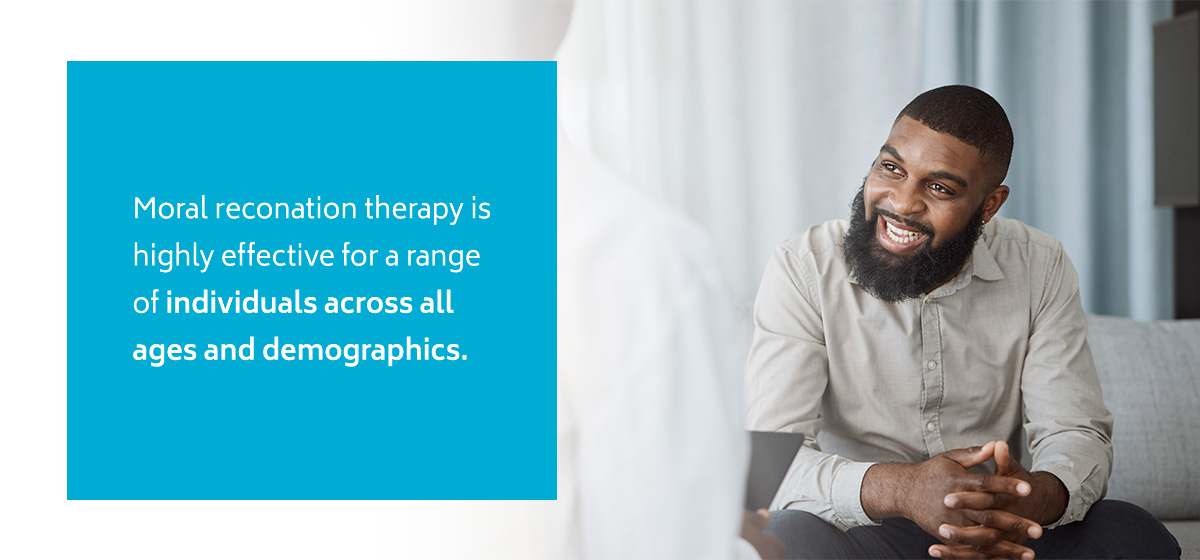
MRT Techniques and Applications
Moral Reconation Therapy has a structure of 16 workbook steps, also known as the "Freedom Ladder," that you can use to guide your clients through exercises that help them recalibrate their moral reasoning and behavior. Typically, MRT is applied in a group setting where individuals can collectively work on self-reflection with open-ended assignments. Running a successful group therapy session involves clarifying your role, building structure into the routine, creating engaging content, soliciting feedback and resolving risks.
The first 12 steps of MRT are considered the most essential. Once an individual completes step 12, you can assess whether they should continue steps 13 to 16 on their own or in a group setting. These are the moral reconation therapy steps:
- Honesty
- Trust
- Acceptance
- Awareness
- Healing damaged relationships
- Helping others
- Long-term goals and identity
- Short-term goals and consistency
- Commitment to change
- Maintaining positive change
- Keeping moral commitments
- Choosing moral goals
Steps 13 through 16 focus on the relationship between a client's personality and inner self. Throughout these steps, you will prepare them to transition to their future.
It is important to note that the first 12 steps of the Freedom Ladder are organized according to the stages of moral reasoning, which is another way to view MRT from a clinical perspective:
- Disloyalty: This stage represents steps one and two of the Freedom Ladder, honesty and trust. It focuses on moral judgments, lying, cheating, stealing and exploitative relationships.
- Opposition: This stage represents step three of the Freedom Ladder, acceptance. It encourages clients to be more honest and reduces the tendency to blame others for their behavior.
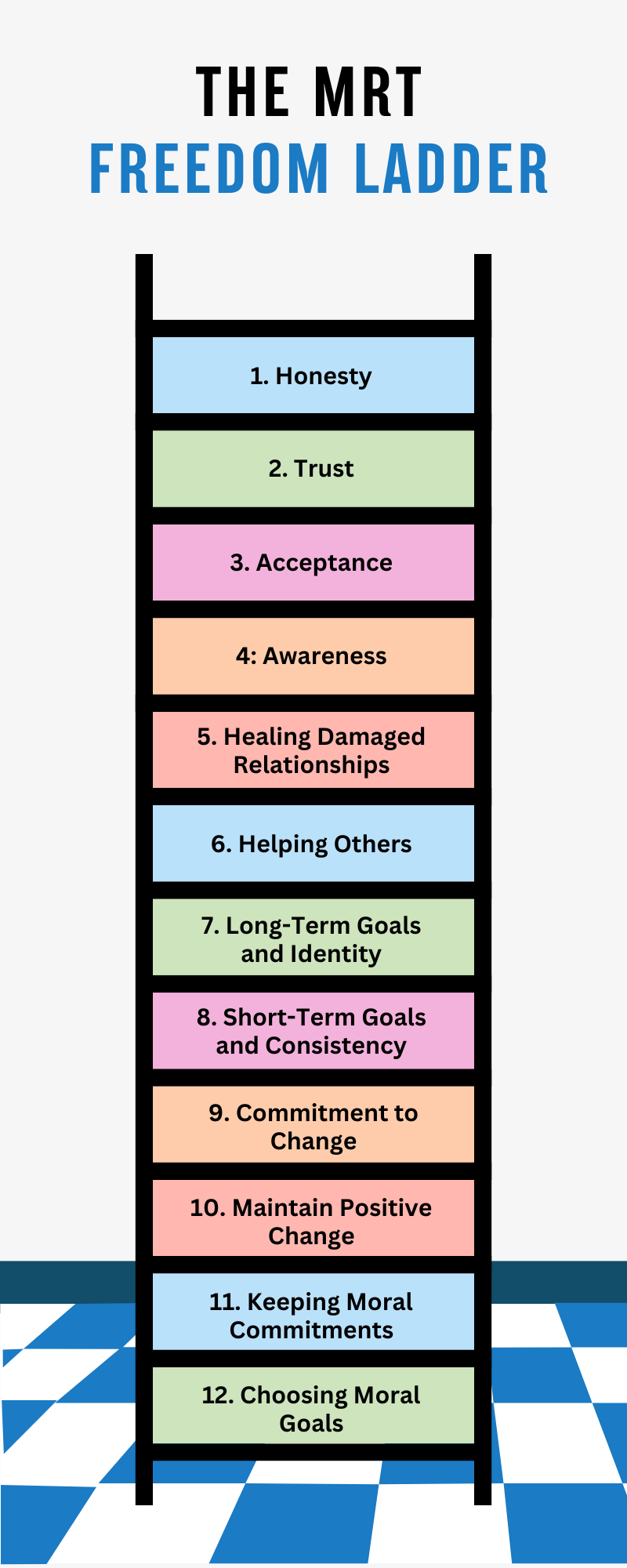
- Uncertainty: This stage represents step four of the Freedom Ladder, awareness. Clients may not be fully committed to change yet but question their reasoning and behavior.
- Injury: This stage represents steps five and six of the Freedom Ladder, healing damaged relationships and helping others. Clients at this stage still exhibit challenges in meeting their obligations, but they start to acknowledge the role they have played in hurting others with their actions.
- Nonexistence: This stage represents steps seven and eight of the Freedom Ladder, long-term identity and short-term goals and consistency. Clients in the nonexistence stage start to build fulfilling relationships and understand right from wrong.
- Danger: This stage represents steps nine and 10 of the Freedom Ladder, commitment to change and maintain positive change. Clients in the danger stage start to develop long-term goals and form positive identities.
- Emergency: This stage represents step 11 of the Freedom Ladder, keeping moral commitments. It encourages individuals to urgently fulfill their personal responsibilities and goals based on moral reasoning rather than their individual needs.
- Normal: This stage represents step 12 of the Freedom Ladder, choosing moral goals. Clients fully develop their identities, learn to make decisions while considering the welfare of others and get involved in social causes.
- Grace: In the final stage of moral reasoning, clients reach the highest level of moral development. They recognize the needs of others and lend themselves to community causes without the expectation that they will benefit. Reaching this stage of moral reasoning is not very common, which is why steps 13 through 16 are optional and more individualized.
MRT Applications in Various Settings
Moral reconation therapy can be adapted in various outpatient and inpatient settings across different behavioral health disciplines, including:
- Drug courts.
- Prisons.
- Parole and probation facilities.
- Substance abuse treatment.
- Anger management.
- Community-based programs.
- Domestic violence treatment.
- Psychological and behavioral health educational settings.
- Residential treatment programs.
Benefits and Outcomes of Moral Reconation Therapy
MRT aims to increase moral reasoning to reduce recidivism. Here are examples of the impact of moral reconation therapy on client behavior and cognition.
1. Decreased Recidivism
Recidivism is the tendency for an individual to reoffend even after experiencing negative consequences for their actions. One of the primary objectives of MRT is to reduce recidivism among clients, especially those who have a high chance of engaging in substance abuse and criminal activities.
Using the cognitive and moral practices in moral reconation therapy training, you can help reduce the behavioral factors that contribute to criminal behavior in your clients. MRT encourages individuals to improve their adaptive skills and avoid ending up back in prison or with another conviction.
2. Reduced Substance Abuse
Individuals released from prison who struggle with substance abuse are at a much higher risk of reincarceration. Providing high-quality behavioral health services like MRT can support clients and lower their chances of continuing substance abuse in the future.
Moral reconation therapy teaches clients to take responsibility for their actions and understand the difference between right and wrong, which can foster accountability and help reduce the recurrence of substance-related conditions.
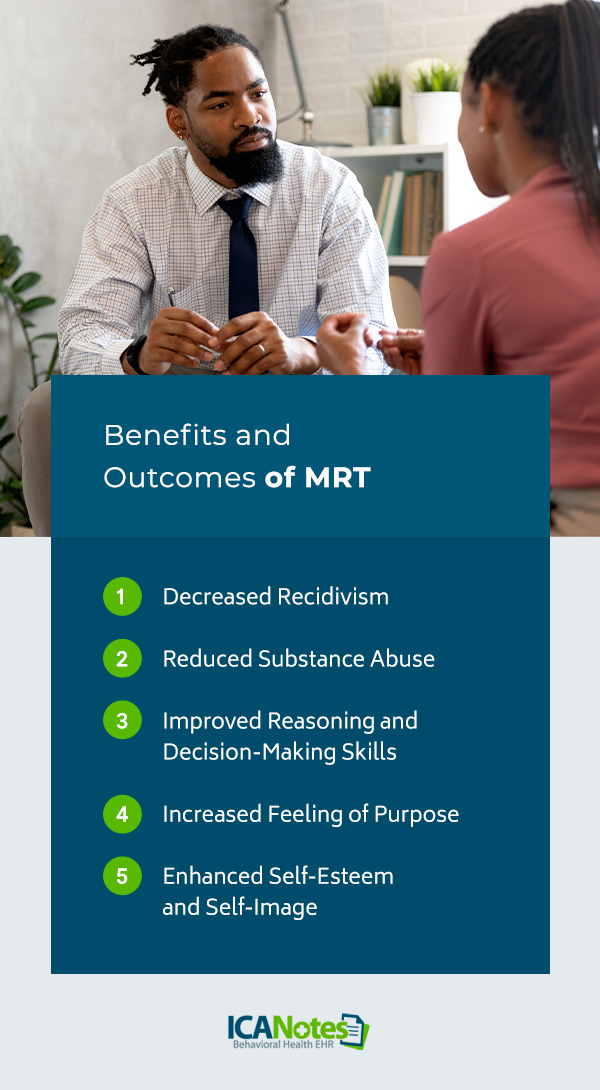
3. Improved Reasoning and Decision-Making Skills
MRT challenges individuals to develop higher levels of moral reasoning and make the right choices, which can impact their decision-making. MRT treatment encourages clients to understand how their behavior affects those around them, which can help them think twice before acting and potentially result in fewer destructive and impulsive behaviors.
4. Increased Feeling of Purpose
Substance abuse conditions often occur with mental health disorders, including anxiety and depression. Those who experience these mental health conditions may have a decreased feeling of purpose or sense of belonging. MRT treatment can help individuals find their purpose and identify their value.
During MRT, clients can engage in cohesive group therapy to build a sense of belonging and support from other members.
5. Enhanced Self-Esteem and Self-Image
Like CBT, Moral reconation therapy is rooted in challenging negative self-beliefs and thinking patterns. It helps clients reduce harmful behaviors and develop a more positive sense of self. Through the various steps in the Freedom Ladder, individuals can learn to make choices according to their values, which can boost their overall self-esteem and confidence.
Challenges and Implementation of MRT
As with any therapeutic intervention, moral reconation therapy may not be suitable for all clients and may vary in its effectiveness depending on implementation methods and client commitment levels. Here are some challenges you may face when engaging clients in MRT.
Common Challenges in Moral Reconation Therapy
While MRT can be beneficial for many treatment-resistant clients, you may experience potential barriers that can impact successful implementation, such as unique factors that contribute to substance abuse and criminal behavior. For instance, factors like abuse, socioeconomic status, trauma and racism can all influence an individual's likelihood of reoffending.
Additionally, some believe that MRT encourages a deficit-based view of clients with a criminal or substance abuse history, which can unintentionally undermine their self-determination.
Finally, mental health professionals in correctional and noncorrectional settings must be adequately trained in MRT to effectively deliver quality care. In some cases, therapists and behavioral health clinicians may also have to consider the challenges of overcoming client resistance to MRT and implementing a judgment-free, supportive environment.
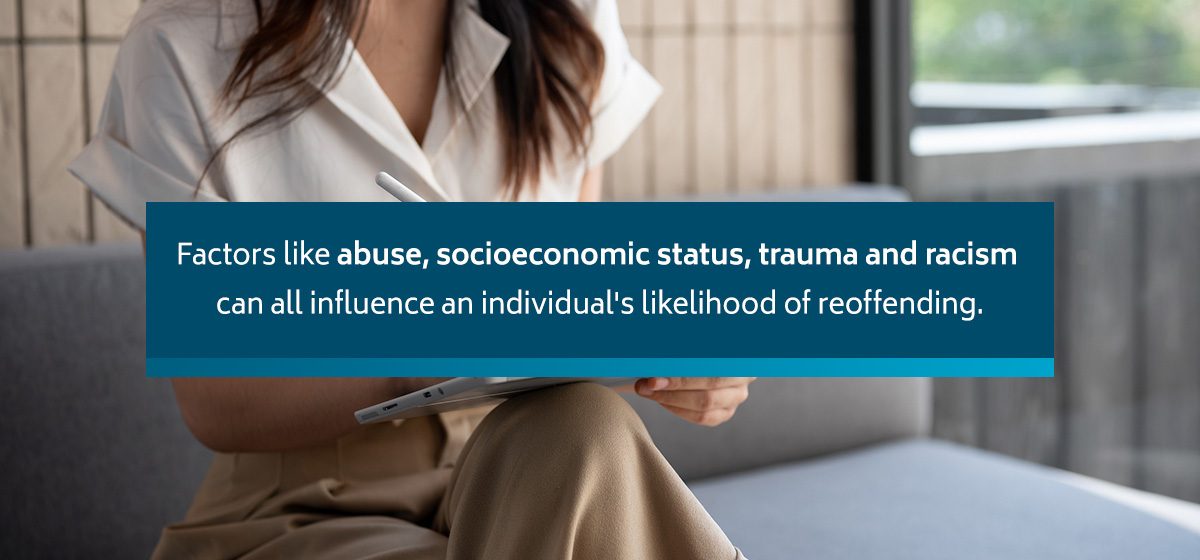
Implementing MRT in Therapy Settings
MRT commonly involves group therapy, but it can also include individual sessions for extra support. The duration and frequency of MRT sessions depend entirely on your assessment of the client and their individual needs.
As a therapist, counselor or psychologist, you can integrate MRT into your practice by providing workbooks and homework assignments based on the 12 to 16 steps listed above. Here are some examples of subjects to cover:
- Confronting beliefs and attitudes
- Assessing current relationships
- Repairing negative relationships
- Practicing communication and forgiveness
- Building higher levels of moral reasoning
- Improving frustration tolerance
- Developing a positive identity
- Reinforcing healthy habits
- Identifying negative consequences of past behavior
- Recognizing personal strengths and limitations
- Reducing self-destructive tendencies
- Making amends for past wrongdoings
- Identifying positive social influences
Solutions and Documentation for Enhanced MRT Practice
Proper documentation and access to effective tools are critical components of any successful therapeutic intervention. The importance of accurate and thorough notes cannot be overstated, particularly because moral reconation therapy must be implemented consistently.
Using an electronic health record (EHR) solution for MRT charting and billing will help you maintain accurate records, provide continuity of care and identify areas of improvement.
Why Trust ICANotes for Your MRT Notes?
As a mental health professional, you play an essential role in helping your clients understand the consequences of their actions and reflect on their current relationships.
Identifying negative influences, setting personal goals and building a supportive network can all contribute to your client's recovery. Accurate, complete documentation is vital during MRT treatment, as it will serve as a necessary tool to help your client examine their past thoughts and beliefs about themselves and the world.
Since 1999, ICANotes has prioritized helping behavioral health clinicians like you maintain accurate, legible and secure notes throughout treatment. Our EHR enables you to streamline documentation with personalized narrative notes and treatment plans. ICANotes software was designed by clinicians for professionals across all behavioral health disciplines and settings.
Our menu-driven behavioral health software allows you to create high-quality, compliant notes so that you can focus on delivering quality care while meeting the strict demands of mental health care.

Get Your Free 30-Day Trial - no credit card required!
Learn How ICANotes Enhances MRT Practice and Documentation
Like CBT and other forms of behavioral therapy, MRT is an effective, evidence-based technique that can help improve moral reasoning and self-identity in clients with a substance abuse or criminal background. As a therapist, you play a vital role in guiding your client through the steps of moral reconation therapy and stages of moral reasoning to encourage positive self-identity.
Maintaining accurate MRT documentation is key to monitoring your client's progress and determining the effectiveness of therapeutic interventions. With ICANotes, you can focus on addressing the root causes of addiction and criminal behavior by organizing your workbook steps, group exercises and homework assignments with customizable templates.
Start your free trial today or schedule a demo to learn how to write better mental health notes with our intuitive EHR.
Sources:
- https://pmc.ncbi.nlm.nih.gov/articles/PMC9426716/
- https://www.academia.edu/111252630/Moral_Reconation_Therapy
- https://www.franklincountywa.gov/718/Moral-Reconation-Therapy-MRT-Program
- https://www.icanotes.com/2024/06/24/how-to-run-a-group-therapy-session/
- https://pmc.ncbi.nlm.nih.gov/articles/PMC9451082/
- https://www.samhsa.gov/mental-health/mental-health-substance-use-co-occurring-disorders
- https://www.icanotes.com/2024/10/24/social-determinants-of-health-and-substance-abuse/
- https://www.icanotes.com/2024/10/07/conducting-strength-based-assessment-in-mental-health-treatment/


